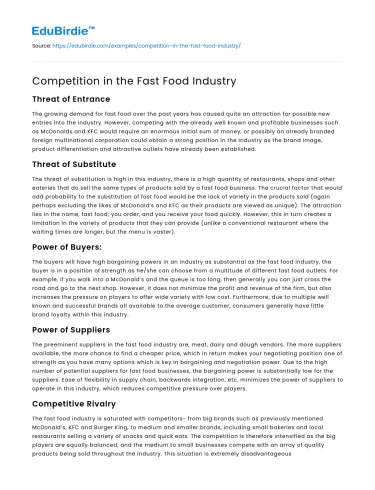Table of contents
- Threat of Entrance
- Threat of Substitute
- Power of Buyers:
- Power of Suppliers
- Competitive Rivalry
Threat of Entrance
The growing demand for fast food over the past years has caused quite an attraction for possible new entries into the industry. However, competing with the already well known and profitable businesses such as McDonalds and KFC would require an enormous initial sum of money, or possibly an already branded foreign multinational corporation could obtain a strong position in the industry as the brand image, product differentiation and attractive outlets have already been established.
Threat of Substitute
The threat of substitution is high in this industry, there is a high quantity of restaurants, shops and other eateries that do sell the same types of products sold by a fast food business. The crucial factor that would add probability to the substitution of fast food would be the lack of variety in the products sold (again perhaps excluding the likes of McDonald’s and KFC as their products are viewed as unique). The attraction lies in the name, fast food; you order, and you receive your food quickly. However, this in turn creates a limitation in the variety of products that they can provide (unlike a conventional restaurant where the waiting times are longer, but the menu is vaster).
Power of Buyers:
The buyers will have high bargaining powers in an industry as substantial as the fast food industry, the buyer is in a position of strength as he/she can choose from a multitude of different fast food outlets. For example, if you walk into a McDonald’s and the queue is too long, then generally you can just cross the road and go to the next shop. However, it does not minimize the profit and revenue of the firm, but also increases the pressure on players to offer wide variety with low cost. Furthermore, due to multiple well known and successful brands all available to the average customer, consumers generally have little brand loyalty within this industry.
Power of Suppliers
The preeminent suppliers in the fast food industry are, meat, dairy and dough vendors. The more suppliers available, the more chance to find a cheaper price, which in return makes your negotiating position one of strength as you have many options which is key in bargaining and negotiation power. Due to the high number of potential suppliers for fast food businesses, the bargaining power is substantially low for the suppliers. Ease of flexibility in supply chain, backwards integration, etc. minimizes the power of suppliers to operate in this industry, which reduces competitive pressure over players.
Competitive Rivalry
The fast food industry is saturated with competitors- from big brands such as previously mentioned McDonald’s, KFC and Burger King, to medium and smaller brands, including small bakeries and local restaurants selling a variety of snacks and quick eats. The competition is therefore intensified as the big players are equally balanced, and the medium to small businesses compete with an array of quality products being sold throughout the industry. This situation is extremely disadvantageous for an up and coming business without an already established brand and/or capital.






 Stuck on your essay?
Stuck on your essay?

